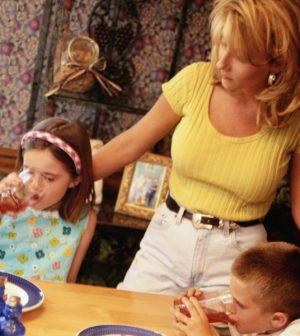- Could Your Grocery Store Meat Be Causing Recurring UTIs?
- Are You Making This Expensive Thermostat Error This Winter?
- Recognizing the Signs of Hypothyroidism
- 10 Strategies to Overcome Insomnia
- Could Artificial Sweeteners Be Aging the Brain Faster?
- Techniques for Soothing Your Nervous System
- Does the Water in Your House Smell Funny? Here’s Why
- Can a Daily Dose of Apple Cider Vinegar Actually Aid Weight Loss?
- 6 Health Beverages That Can Actually Spike Your Blood Sugar
- Treatment Options for Social Anxiety Disorder
Helping Your Kids Cope With Your Divorce

Kids react to divorce in different ways.
One may be sad and let schoolwork slip. Another might be anxious or angry and act out these feelings. A third might pretend not to have any feelings about it at all.
Here are steps you might take to help your children navigate this difficult time for the entire family.
Before you actually tell your kids about the impending divorce, practice what you’ll say about your decision without any anger. You want to make clear that the divorce is not their fault, the American Academy of Child & Adolescent Psychiatry states. If possible, both parents should be present. Be prepared to answer your kids’ questions about how their lives will change, such as where everyone will live and whether they’ll need to switch schools.
If you feel the need to criticize or blame your partner, do it away from home and the children and with a friend or a therapist. Don’t share your anger with your children. Hearing your gripes can make kids feel as though you expect them to take sides.
Each parent should support the other’s one-on-one time with the kids. Children who enjoy time with both parents won’t feel like they have to love one parent more than the other. Keep everyday life as normal as possible. You may be tempted to relax the rules, but this can actually make kids more insecure. A regular routine reinforces the idea that mom and dad can be relied on for stability and care.
Finally, stay alert for signs of difficulty adjusting to the new family situation and talk to your pediatrician or a child psychologist if needed.
More information
The Nemours Foundation has suggestions for helping children deal with divorce.
Source: HealthDay
Copyright © 2026 HealthDay. All rights reserved.










